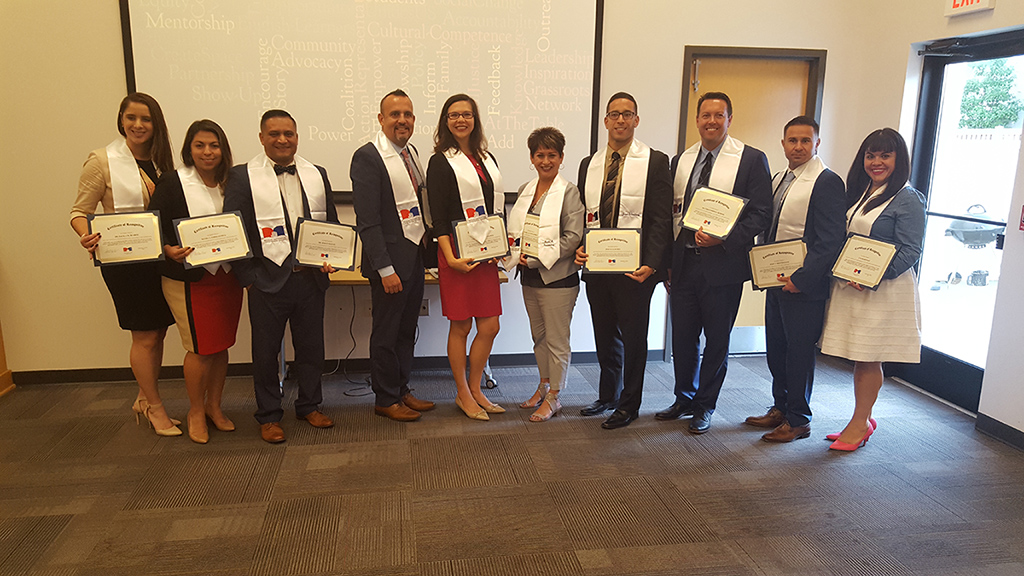All About ESSA: Veteran Florida Educator Rosa Castro Feinberg Explains Why Civil Rights Advocates Are Critical of the State’s Newly Approved Education Plan

In September, Florida became the last state in the union to receive U.S. Department of Education approval to implement its plan for the Every Student Succeeds Act, the federal law governing US education policy from kindergarten to 12th grade. Civil rights groups including UnidosUS remain concerned about the long-term impact Florida’s plan will have on the state’s 300,000 English language learners. They believe the state’s new grading system to determine each school’s level of financial and logistical support will do little to ensure the success of the state’s most vulnerable students. In fact, they say it hides unfair educational practices in spiffy-looking report cards.

To better understand this, UnidosUS caught up with veteran Florida educator Rosa Castro Feinberg. Over her five-decade career, she has served as a teacher and board member of Miami Dade Public Schools, as an education professor at Florida International University, and as an education consultant for the US Agency for International Development in Latin America, and in 1988, her election to the Miami Dade County School Board made her the first Hispanic woman ever elected to serve in county government. During that time, she has helped South Florida adapt to a student population that has greatly diversified through migration from across the Western Hemisphere by teaching and by helping school districts and state education agencies in a 14-state area improve programs for language minority students.
During the last board meeting of her term in office, her colleagues on the board voted to support her board item to dramatically increase opportunities for students to participate in bilingual programs. Now retired, Castro Feinberg volunteers as the co-chair of government and media relations for the Florida chapter of the nationwide Latino civil rights organization LULAC.
Progress Report met with Castro Feinberg this month to discuss the details of Florida’s ESSA plan.
Q: What is the purpose of the Every Student Succeeds Act?
A: Explicitly stated in that act, the purpose is to provide all children significant opportunity to receive a fair, equitable, and high-quality education, and to close education achievement gaps. The law does this in two ways. It provides resources – or money –to counteract low achievement and the effects of poverty in our schools. This law passed in 1965 under the name of the Elementary and Secondary Education Act, so it’s not only an education law, it’s also a civil rights law. It was part of that whole package of legislation that came out in the 1960s with a civil rights thrust. The other way it helps is by focusing attention on the state’s system of what it calls meaningful differentiation of schools. In Florida that translates to the school report card grade. But Florida’s plan will not include subgroup performance or progress in gaining English language proficiency in the calculations for the school report card grade.
Q: You’ve got some of the data spread before you now, including a chart outlining Florida’s system of school and district accountability. What does this tell us?
A: They have all the indicators in one row, and then they have what’s called the Florida component, which leads to the Florida report card grade in another. They identify the possible points for each indicator, and then they show whether the points are applied to the school grade or to the Federal Percent of Points Index, a new and creative invention designed, I believe, specifically to permit the appearance of including the required indicator of English language proficiency without actually doing it.
There are about 4,000 schools in Florida. One thousand of them are on this chartshowing that these A, B, and C schools have subgroups that need help. That means one of out of every four schools in the state is getting a good grade out of its report card grade – A, B, or C – and is being dinged on the federal index for not properly serving all the subgroups.
How is a parent, how is a taxpayer supposed to interpret a school that has two readings, one of which is widely publicized – the school report card grade – and the other one of which they’re going to report once a year and put it online somewhere?
It seems to me that the Florida Department of Education is short changing students by denying the attention that they would get had they been included in calculations for the school report card grade, and by not increasing or at least not saying that they’ve increased the numbers of staff members at the Florida Department of Education who are available to follow up and help districts eliminate those achievement gaps, whose elimination is partly the purpose of ESSA. For that reason, there are many organizations that have been protesting the direction that the Florida Department is taking.
Q: So what can parents, students, educators, and civil rights activists do to address this?
A: They can be the eyes and ears we need in every school, checking to see that the children are getting access to the curriculum and help in learning the English language. They can report problems to their elected officials, to the news media, to the advocacy organizations and parent organizations that are there to help all children.
Every student has the right to equal access to a quality education. That’s a legal right, federal and state rules and laws all protect that right. We need to honor that mandate and do the best that we can for the children who are struggling in our schools, hidden away in little pockets of educational misery, hidden from view because of the way we do our accountability system. The current plan is a bit better than the situation under the prior plan. It’s like a light coming in under the door with this federal index, but it’s not tearing down the wall and letting the sunlight come in and that’s what we need, and that’s what we hope the legislature will allow us to achieve – in the Sunshine State.
We desperately need a state advisory council on the education of English language learners. For years, the Department of Education has gotten itself into problems because it has not had a sufficient stream of information from folks who know the field and know the ins and outs of the issues, and it’s not going to get any better. This current ESSA plan is a clear indication that the Department of Education still needs help. We’re here to help but not going to be able to do that unless the Florida legislature pens in statute a definition of parent and community engagement so that there’s guidance for the Florida Department. Parents can help make that happen by asking candidates for elected office what they plan to do to improve the state’s ESSA plan and when they will do it. And, then, very important, by voting and helping to turn out the vote.
Q: Why are English language learners such a big priority for civil rights activists in the state of Florida?
Ten percent of Florida’s students are English language learners. That’s almost 300,000 students. Why is it important? Well number one, they’re human beings and they’re entitled to everything everyone else gets.
The Historically Black Colleges have a motto: “A mind is a terrible thing to waste,” and it sure is. We can’t afford to waste any of them. Education Week recently came out with an article explaining that the National Association for Gifted Education is very concerned that relatively few English language learners get identified as gifted and that it’s a waste of human talent. One of the things they recommended is the use of native language assessments in order to identify gifted and talented students. That’s one of the issues that we might want to explore today- the advantages and the reasons why native language assessment should be part of the state’s accountability system. We need to improve education for English language learners because they have a legal right to equal access to educational opportunities, and we all benefit from having all our students get the most that they can get from their public school education.
Q: What are some of the positive impacts these English language learners have made in the state of Florida?
One example of what our English language learners can do goes back to Operation Peter Pan. It began in 1960 when parents in Cuba decided they had to get their kids off the island before they got drafted into the military to support the Revolution. The Catholic church organized a sort of underground railroad except it was an airlift, bringing some 14,000 children from Cuba to the United States, where the church could oversee their care until they were reunited with their families. Children from Operation Pedro Pan have ended up in very important positions making enormous contributions to society in remarkable ways. For example, Octavio Oviedo became a superintendent of the Dade County School Board and Mel Martinez, a Congressman in the Orlando area. Those are just two examples of what can happen if we cherish, care for, and properly educate our students.
One of the requirements in ESSA is for the states to make every effort to make assessment instruments available in the native languages of those groups with a significant presence in the school system. Florida has declined to do so and had to be pushed to identify this significant presence. All they could find were Spanish speakers, who represent 70-80 percent of the English language learner population. The second largest group is composed of over 20,000 speakers of Haitian Creole. Then we need to take the next step and make those native language assessment instruments available for all assessments required by the state.The state says we can’t do that because we have this official English law.
Q: The US has no federal law stating that English is the official language, but Florida does?
A: The Florida Department of Education says they cannot offer native language assessments because of a 1988 amendment to the Constitution. In Article II section 9, it states: (a) English is the official language of the state of Florida. (b) the legislature shall have the power to enforce this section by appropriate legislation.
However, If you look at Florida Department of Education website, you will see under their Newsroom section that they issue press releases in English and in Spanish. If you look at their School Choice page, there’s a statement that materials are available in Spanish and in Haitian Creole. If you look at the governor’s website, you’ll see a Spanish language page. If you look at the State Board of Education rules for accommodations on testing, you will see explicit permission for teachers to provide translations of the directions on the tests to the native language of the students. If you look at the regulations passed by the State to implement the Biliteracy Seal program, you will see that students are required to pass tests in English and also in another language- very often the native language- in order to earn the award. All of these are examples of how the state does in fact use languages other than English for official business in the state and how the Florida Department of Education in particular does that. The state’s Official English amendment includes no restrictions on education at all.
Q: What is one major example of how this impacts current students in the state of Florida?
A: Of the recently arrived Puerto Rican evacuees from Hurricane Maria, 11,000 students, 80 percent are English language learners. For those who are in high school and have opted for a Florida high school diploma, they are faced with a new curriculum, new standards, and a test they must pass in a language they don’t understand or they won’t earn a high school diploma. That’s unconscionable. That should not be allowed to happen.
-Progress Report Senior Web Content Manager Julienne Gage conducted this interview.



